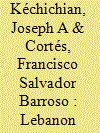| Srl | Item |
| 1 |
ID:
189531


|
|
|
|
|
| Summary/Abstract |
The article examines how the lack of circulation of political elites has contributed to setting up an economic–political system designed to avoid the construction of a political entity and common Lebanese identity for fear of losing their traditional role and privileges on the political scene. Toward this, the article provides a general assessment of the Lebanese consociational democracy to understand the elements and factors hampering this form of political governance. Then it delves into the main socio-political factors that allow the triumph of communitocracy. It shows how the lack of circulation on elites, on the one hand, the consociational system on the other, affect democratization and nation-building processes. It throws light on the misbehavior of the Lebanese elites concerning the challenge that democracy and national building represent.
|
|
|
|
|
|
|
|
|
|
|
|
|
|
|
|
| 2 |
ID:
157701


|
|
|
|
|
| Summary/Abstract |
Lebanese consociationalism has been under stress due to serious internal and external pressures. Though Lebanese regional and global leaders continue to pay lip service to Lebanon’s unity and uphold putative commitments to its sovereignty and territorial integrity, partition to resolve internal crises remains on the table. After a long and still unsettled civil war, absolute internal discord among citizens and, increasingly, the uprisings throughout the region, partition was and is once again openly discussed by many even if most camouflage it under the decentralization, federalism, or con-federalism schemes. The article underlines the inherent vulnerabilities of the Lebanese state and analyzes its deep fault lines raising a serious question about the future integrity of Lebanon.
|
|
|
|
|
|
|
|
|
|
|
|
|
|
|
|
| 3 |
ID:
177518


|
|
|
|
|
| Summary/Abstract |
For nearly a century, the absence of ethical norms within Lebanese political circles encouraged the practice of corruption that transformed the praxis into an unparalleled art form, one that generated clout-wielding elites. Sophisticated public power mechanisms created for the benefit of the country's eighteen religious denominations, transformed them into partners-in-corruption, secured greater quotas of power, and exclusive hold on all public resources. What this translated into was a “neo-patrimonial” dynamic, which the October 2019 revolutionaries challenged, with calls to reconsider the political management of the country as well as the existing system of government. The 2020 impact of the Coronavirus (COVID-19) disease aggravated conditions, as Beirut displayed amateurish attention to serious health challenges, which added insults to ongoing economic injuries. This paper evaluates what political elites actually did, even at the height of enduring crises, focusing on the banking sector to highlight the rise of a new mafiocracy. It closes with an assessment of future challenges that Beirut will confront.
|
|
|
|
|
|
|
|
|
|
|
|
|
|
|
|